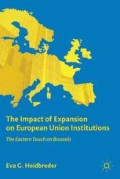Abstract
The null hypothesis, challenged here, is that competences delegated to the Commission remain limited to the Copenhagen enlargement context as institutionally designed. The general hypothesis derived from the theoretical framework is that the successful implementation of policies in the Copenhagen framework creates functional pressure for further integration (necessary condition) but that only if member state governments do not expect political spillover to ensue, they will tolerate an extension of the Commission’s action capacity (sufficient condition).
Access this chapter
Tax calculation will be finalised at checkout
Purchases are for personal use only
Copyright information
© 2011 Eva G. Heidbreder
About this chapter
Cite this chapter
Heidbreder, E.G. (2011). The Analytical Framework: Design of the Empirical Study. In: The Impact of Expansion on European Union Institutions. Palgrave Macmillan, New York. https://doi.org/10.1057/9780230118584_3
Download citation
DOI: https://doi.org/10.1057/9780230118584_3
Publisher Name: Palgrave Macmillan, New York
Print ISBN: 978-1-349-29357-5
Online ISBN: 978-0-230-11858-4
eBook Packages: Palgrave Political & Intern. Studies CollectionPolitical Science and International Studies (R0)

